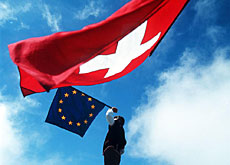
Endgame nears for Swiss-EU bilateral talks

European Union diplomats meet on Thursday to discuss a last-ditch compromise deal aimed at sealing a new set of bilateral accords with Switzerland.
The key sticking point has been the EU’s Schengen agreement on cross-border crime – the Swiss want an opt-out on part of the treaty to protect banking secrecy.
Brussels is under pressure to reach an agreement before the end of June and has signalled that it is prepared to grant Switzerland the exemption it requires.
But at a meeting of EU finance ministers on Tuesday, Luxembourg made it clear it would use its right to veto the deal if it was not granted a similar opt-out.
“I would like that what applies to the Swiss applies also to the others within the European Union,” said Luxembourg’s finance minister, Jean-Claude Juncker.
Ball in EU’s court
EU diplomats now have to decide whether to accept a compromise which would also allow Luxembourg to keep its own banking secrecy regulations.
If the compromise is endorsed on Thursday, a delegation of Swiss cabinet ministers will head to Brussels on May 19 for a final round of high-level negotiations aimed at signing off on the complete package of bilateral treaties.
Ahead of Thursday’s meeting, the Swiss government announced it was willing to make a multi-million franc contribution to the EU’s fund for economically-depressed member states.
The European Commission welcomed Switzerland’s offer to provide SFr1 billion (€650 million) over a five-year period for the poorest EU countries.
The funding is subject to the successful conclusion of bilateral negotiations.
Complicated negotiations
Two years of negotiations between Brussels and Bern have been marked by the dispute over Swiss banking secrecy and further complicated by the enlargement of the EU on May 1.
Back in June 2002 a first series of seven bilateral treaties – mainly on labour, trade and transport issues – came into force between Switzerland and the EU.
Just two weeks later, officials from both sides returned to the negotiating table to discuss a follow-up package of ten accords.
Swift progress was made on six dossiers, including Swiss participation in EU education programmes and environmental projects.
But negotiations faltered on the issues of taxation and Swiss membership of the Schengen and Dublin accords, which cover customs fraud and closer cooperation on security and asylum.
Compromise reached
A compromise was reached on the taxation dossier when the Swiss agreed to transfer a withholding tax on EU residents’ savings income to Brussels. This guaranteed banking secrecy and at the same time satisfied the EU’s tax collectors.
But the Swiss government made its agreement conditional on the successful conclusion of all the other bilateral accords under discussion.
Hopes were high that an accord on the withholding tax issue would speed up negotiations on closer security cooperation and efforts to combat customs fraud.
But talks again ground to a halt late last year over a clause in Schengen relating to legal assistance in cases of fiscal fraud.
The EU wanted to extend judicial assistance to include tax evasion – something which is not considered a criminal offence under Swiss law.
The Swiss fear that banking secrecy will be undermined if they are made to hand over information about suspected tax evaders.
Breaking the deadlock
After a break of several months, talks resumed in April with a meeting between Switzerland’s chief negotiator, Michael Ambühl, and his counterpart from the EU Commission, Percy Westerlund.
Both sides agreed on a compromise proposal which foresees that Switzerland will apply legal assistance in cases of indirect taxes (customs, value added tax, and levies on alcohol and tobacco).
But Bern would be exempted permanently from granting the same rights in cases of direct taxation (income tax, corporate tax and capital gains).
Two other issues – granting access to the Swiss labour market to the ten new EU members and Switzerland’s contribution to the special fund to help the least prosperous states – have since been added to the compromise package.
swissinfo
The nine dossiers which make up the second set of Swiss-EU bilateral accords include:
Closer cooperation on security and asylum (Schengen/Dublin).
The fight against international smuggling and other forms of customs fraud.
Taxation of EU residents’ savings income in Swiss banks.
Education and vocational training programmes.
Membership of the European Environmental Agency.
Media – film production, distribution and training.
Free trade of processed agricultural products, such as chocolate, biscuits and pasta.
Access to pan-European statistics.

In compliance with the JTI standards
More: SWI swissinfo.ch certified by the Journalism Trust Initiative






























You can find an overview of ongoing debates with our journalists here . Please join us!
If you want to start a conversation about a topic raised in this article or want to report factual errors, email us at english@swissinfo.ch.